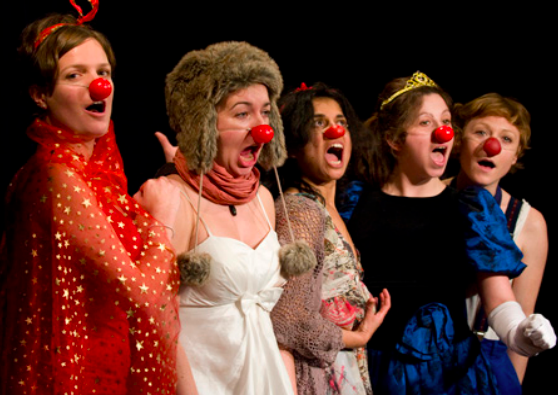Qu’est ce que la Communication Nonviolente (CNV) ?
La Communication Nonviolente (CNV) ou Bienveillante, élaborée par Marshall Rosenberg, est un art de vivre, un processus de communication qui favorise entre autres l’écoute mutuelle afin de prévenir les conflits ou de les résoudre d’une manière pacifique malgré leur complexité.
Pour plus d’infos sur le stage clown cliquez ici.
Comment aborder la Communication Nonviolente avec nos formations CNV ?
Pour aborder la Communication Nonviolente* (CNV), nous vous proposons 4 formules de formations CNV :
* La CNV est uniquement animée par un formateur(trice) certifié(e).
QUELS SONT LES FORCES DU THEATRE MODERNE INSPIRÉ DE LA COMMUNICATION NONVIOLENTE ?
- Une pédagogie ludique et interactive.
- Des jeux de rôles, mises en situations et simulations proches de la réalité.
- L’utilisation des techniques d’acteur.
- Des intervenants certifiés, performants, efficaces et dotés d’un véritable sens de l’humour.
- Nous mettons à votre disposition une formation sur mesure qui prend en compte les particularités de chacun.
NOS MÉTHODES ET OUTILS INSPIRÉS DE LA COMMUNICATION NONVIOLENTE (CNV)
- Une méthode pédagogique interactive et ludique : alternance entre les jeux de rôle, les exercices, les évaluations et la théorie
- Jeux de rôles : Les situations professionnelles, proches de la réalité sont jouées avec le comédien comme partenaire de jeu.
- Une approche personnalisée : les objectifs et problématiques professionnels de chacun sont pris en considération.
- Utilisation des techniques d’acteur pour perfectionner sa communication verbale et non-verbale.
- Une analyse à partir des vidéos tournées pendant la formation pour comprendre les mécanismes de blocage.
- Le processus de la Communication Nonviolente (Marshall Rosenberg) ou Communication Bienveillante pour un dialogue constructif.
- Innovation : le clown de théâtre comme outil d’interaction et d’expression des émotions.
- Les coachs et formateurs sont des experts certifiés dans leur domaine, dotés d’un véritable sens de l’humour.
FORMATION À LA COMMUNICATION NONVIOLENTE (CNV) OU BIENVEILLANTE – MODULE 1
En présentiel sur demande, nous contacter
Module 1 : La base d’une communication constructive – La relation à soi
“Les hommes le plus souvent se querellent pour des mots.” Anatole France
Souhaitez-vous découvrir le processus de la Communication Nonviolente (CNV) au service de la relation professionnelle et personnelle ?
FORMATION A LA COMMUNICATION NONVIOLENTE (CNV) OU BENVEILLANTE – MODULE 2
Module 2 : La relation à l’autre – L’ouverture au dialogue
“La règle d’or de la conduite est la tolérance mutuelle.” Gandhi
FORMATION À LA COMMUNICATION NONVIOLENTE (CNV) OU BIENVEILLANTE – MODULE 3
Module 3 : La pratique du dialogue et ses défis
» Il ne sert à rien d’éprouver de beaux sentiments si l’on ne parvient pas à les communiquer . ” Stefan Zweig
Souhaitez-vous sortir d’une communication “habituelle” et arriver à vous exprimer avec clarté, respect et plus efficacement grâce à des techniques et outils inspirés de la Communication Nonviolente (CNV)?
ONLINE PRACTICE WORKSHOP OF COMPASSIONATE COMMUNICATION INSPIRED BY NONVIOLENT COMMUNICATION
Do you feel trapped by your emotions ? Is stress ruining your life? Would you like to improve your well-being and your quality of life at work ? Ready to follow a personal development coaching for your well-being with Marshall Rosenberg’s NVC ? Would you like to try a personal development coaching with emotional regulation and Nonviolent communication ?
We have solutions for you, start by joining our program below! Discover our workshop and training that will help you improve yourself so as to reach your best self.
What is Compassionate-Nonviolent communication (NVC) ?
It’s a way of life more than just a tool. It helps in every area of one’s life. It centers on speaking in a way that inspires compassion and understanding within you and with others. It helps initiate difficult conversation with more benevolence and less harmful emotions.
A workshop of discoveries, exchanges and practices to go to the meeting of oneself and the other from your daily situations with a theoretical contribution. Nonviolent communication or Marshall Rosenberg’s Compassionate Communication will allow you to develop your listening and speaking skills, and even your mediation skills. The Nonviolent communication workshop will allow you to :
- Transform your conflicts into constructive dialogue
- Dare to express yourself and know how to listen with kindness
- Take care of your communication
- Improve your communication to defuse and calmly approach conflict situations
During these practice workshops, we also invite you to create your own partnership groups in order to
- Train with others in Nonviolent communication
- Give and receive empathy and support in daily life
- Connect with others who share the same needs and intentions
How to approach NonViolent Communication with our Compassionate Communication trainings* ?
To approach NonViolent Communication (NVC), we offer 3 Compassionate Communication training formulas inspired by NVC :
*NVC trainings can only be given by certified trainers.
– Three fundamental modules for learning Compassionate Communication inspired by NVC
–Training for managers : Compassionate Communication inspired by NVC and Emotional Intelligence
–A training inspired by NVC : Gratitude, appreciation and positive thoughts
STAGE CLOWN ET COMMUNICATION BIENVEILLANTE (CNV)
Osez jouer avec votre vulnérabilité – Osez partager avec votre public.
“ En faisant scintiller la lumière et l’ombre de notre clown , nous offrons aux autres la possibilité d’en faire autant. ”
Inspiré de Nelson Mandela
Le clown de théâtre est un personnage qui se construit à partir de sa personnalité, qui éprouve et partage son humanité en empathie en prenant en compte la réaction de l’autre.
Cette formation CNV et clown permet d’agrandir sa propre palette d’outils de communication pour optimiser sa relation avec l’autre. Elle permet d’affiner sa conscience du corps, sa gestuelle et d’exprimer ses émotions de façon singulière.
Comment la Communication Bienveillante inspirée de la Communication Nonviolente permet-elle d’être en accord avec soi-même et avec autrui ?
La dynamique du clown et la Communication Bienveillante inspirée de la Communication Nonviolente (CNV) de Marshall Rosenberg sont des outils de prédilection pour vivre sa vie avec bienveillance vis à vis de soi-même et d’autrui.
À qui est destinée cette formation CNV ? Chaque personne qui aurait envie de créer un dialogue constructif avec soi-même, son “enfant intérieur” et dans une écoute bienveillante avec autrui.
Chaque accompagnement est individualisé et prend en compte le niveau et l’expérience des participants. Il existe une variante de cette formation : Art du rire au service de la qualité de vie au travail.
TRAINING IN COMPASSIONATE COMMUNICATION INSPIRED BY NONVIOLENT COMMUNICATION- MODULE 1
Module 1 : The basis of a constructive communication – The relationship to oneself
Learn to listen better, hear people better, and respond more effectively to a request.
“The golden rule of conduct is mutual toleration.” – Ghandi
Would you like to discover the process of NonViolent Communication (NVC) at the service of the professional and personal relationship ?
TRAINING IN COMPASSIONATE COMMUNICATION INSPIRED BY NVC- MODULE 2
Module 2 : The relationship with the other – Openness to dialogue
Communicating differently for better cooperation.
“When I give others the empathy they need, it’s not hard to make myself heard.” – Marshall Rosenberg
Would you like to develop new relationship skills through NonViolent Communication (NVC) ?
TRAINING IN COMPASSIONATE COMMUNICATION INSPIRED BY NVC – MODULE 3
Module 3 : The practice of dialogue and its challenges
Practise concrete examples of NonViolent Communication between companies.
“It is useless to feel beautiful feelings if we cannot communicate them.” – Stefan Zweig
Would you like to get away from « usual » communication and express yourself clearly, respectfully and more effectively using techniques and tools inspired by NonViolent Communication (NVC) ?
Want to deepen your NVC learning in a welcoming and caring group?
In order to offer you a solution adapted to your needs, we are launching a Nonviolent Communication practice group on Thursdays, every two weeks from September, online, limited to 8 people. (Registration in advance at the beginning of the month)
The practice and the personalized accompaniment, allow a better learning, better listening and leaves a place for the experience of each. Thanks to the fact of being at home, in complete peace and security, it is easier to leave one’s comfort zone and live rewarding experiences, with the help of a learning specialty in full awareness of one’s communication in a spirit of playful sharing and online games.
Date: from October 10th 2021 – 2 Sundays a month at 8.30 pm
9 WEEKS ONLINE TRAINING OF COMPASSIONATE &DIGITAL COMMUNICATION INSPIRED BY NONVIOLENT COMMUNICATION
I offer you a learning path to discover the best of yourself
The objective of the online course is to create a dialogue where everyone feels taken into account. That is to say, the online communication course is about the basics to improve your communication and make a choice other than your current one.
We will study the keys of success for a dialogue with others.
8 master classes of approximately 120 minutes include time to answer participants’ questions.
Practice classes are organized between trainees and coaching of 45 minutes are proposed to better assimilate the content of the training.
These classes are based on an alternation of theoretical contributions, personalized exercises, practical and concrete cases specific to the company.
OUR CERTIFIED TRAINER

Istvan Van Heuverzwyn, certified trainer and mentor in ICPF-PSI communication, certified trainer in Emotional Regulation « TIPI » and is in the NVC certification path since 2013. He has also followed the complete course of individual coaching with NonViolent Communication.
NONVIOLENT COMMUNICATION AND EMOTIONAL REGULATION
How to establish a dialogue with your employees, in a spirit of listening and respect ? How to express a request to your employees with serenity ? How can we generate interest and commitment in a dialogue ?
The emotional intelligence solicited in the process of NonViolent Communication, allows the development of another part of the brain that favors learning from the heart through emotions and adapted action. Compassionate communication is based on Marshall Rosenberg’s NonViolent Communication. Emotions do not stop at the company’s door; if the manager does not open the door to dialogue, he or she may quickly find himself or herself in unmanageable deadlock situations. In order to avoid this kind of unpleasantness, Marshall Rosenberg’s NonViolent Communication can prove to be an effective tool both in the short and the long term. The challenge is then to know how to open up to the emotions of one’s teams in a search for equity and balance and to change the paradigm by focusing on :
“power with” instead of “power over”
« Co-responsibility » instead of « denial of responsibility »
Compassionate Communication is meant to be adapted to professional situations and to business management. Role-playing will address the participant’s daily routines in order to find concrete solutions or identify the path that will reach the desired destination.
COMPASSIONATE COMMUNICATION INSPIRED BY NVC AND EMOTIONAL INTELLIGENCE TRAINING
A training inspired by NonViolent Communication for managers
GRATITUDE, APPRECIATION AND POSITIVE THOUGHTS TRAINING
Choose : Use 99% of our energy to be unhappy and crticise ourselves, or use 99% of our energy to be happy. Inspired by Guy Courneau
Would you like to value yourself more ?
Do you want to have more drive in life, more moments of sharing and cooperation ?
Would you like to live more amicably and develop more trust between relations ?
This training, inspired by NonViolent Communication, is for all people who aspire to experience more joy, lightness, self-esteem and connection with their professional and personal environment.
WHAT ARE THE METHODS AND TOOLS WE USE DURING OUR PROFESSIONAL TRAINING IN COMMUNICATION AND MANAGEMENT ?
- An interactive and fun teaching method: alternating role-playing, exercises, evaluations and theory.
- Role-playing: Professional situations, close to reality are played with an actor as a game partner throughout the training.
- A personalized approach: the objectives and professional issues of each are taken into consideration during our training.
- The NonViolent Communication process (Marshall Rosenberg) or Compassionate Communication for constructive dialogue.
- Coaches and trainers are certified experts in their field with a true sense of humour.
- Use of actor techniques to improve Verbal and NonVerbal Communication.
- An analysis from the videos shot during the training to understand the blocking mechanisms.
- Innovation : The theatre clown as a tool for interaction and expression of emotions.





